Service Quality Relating to Students’ Satisfaction of Student Affairs Departments in University: Case study in China
Main Article Content
Abstract
The Objectives of this research were to study 1) student’ satisfaction of the service provided by university; 2) service quality of student affairs office in university; and 3) relationship between service quality and students’ satisfaction of the service provided by university. This research uses quantitative research method, based on the SERVQUAL model of perceived service quality theory, combined with the actual service quality of a university student work department, according to five dimensions (reliability, tangibility, assurance, responsiveness, and empathy). The samples consisted of 400 students in the university. The research instrument was a questionnaire that had the overall reliability of 0.94. The statistics used in this research were percentage, mean, standard deviation and hypothesis testing by ANOVA and Regression coefficient
The research results found that; 1) student’ satisfaction of the service provided by university, overall, at a high level. In addition to, the highest level of satisfaction was the convenience; the subordinate aspects were the courtesy, the coordination and the information. 2) Service quality of Student affairs office in university, overall, at a high level. In addition to, the highest level of service quality was the responsiveness and empathy of service quality and 3) The overall relationship between service quality and students’ satisfaction of the service provided by university in the whole have the positive correlation as a high level.
Article Details
License Terms
All articles published in this journal are licensed under the Creative Commons Attribution–NonCommercial–NoDerivatives 4.0 International License (CC BY-NC-ND 4.0).
Under this license, users are permitted to:
- Share — copy and redistribute the material in any medium or format.
Under the following conditions:
- Attribution (BY)
Users must give appropriate credit to the author(s) and the journal, provide a link to the license, and indicate if any changes were made. Attribution must not suggest endorsement by the author(s) or the journal.
- NonCommercial (NC)
The material may not be used for commercial purposes. Any use primarily intended for or directed toward commercial advantage or monetary compensation is prohibited without prior written permission from the copyright holder.
- NoDerivatives (ND)
If users remix, transform, translate, adapt, or build upon the material, they may not distribute the modified material. The work must be shared in its original and unaltered form.
This license ensures that published works remain freely accessible to the academic community and the public, while protecting the integrity of the original research and the rights of the author(s).
For the full legal code of this license, please visit:
https://creativecommons.org/licenses/by-nc-nd/4.0/
References
Chavengsup, P., Rungruang, P., & Wonglek, P. (2021). Service Quality relating to Outpatients’ Satisfaction Chularat 3 International Hospital. Southeast Bangkok Journal, 7(2), 64-81.
Chen, C. H., Chen, W. Y., & Tsai, S. H. (2019). Exploring service quality dimensions of university departments of student affairs: An empirical study. Journal of Hospitality, Leisure, Sport & Tourism Education, 25, 1-10.
Harfika, A. R., & Abdullah, M. (2017). Determinants of Student Satisfaction: Service Quality Dimensions in Higher Education. Journal of Applied Management (JAM), 15(3), 550-562.
Homburg, C., & Giering, A. (2001). Personal characteristics as moderators of the relationship between customer satisfaction and loyalty an empirical analysis. Psychology & Marketing, 18(1), 43-66.
Hsu, Y. C., Chen, C. L., & Lu, H. P. (2021). Service quality and satisfaction of mobile payment users: A comprehensive approach of SERVQUAL and Dematel-ANP. International Journal of Information Management, 57, 102264.
Kuo, Y. F., & Wu, C. M. (2015). The influence of service quality on student satisfaction: A study of university libraries in Taiwan. Journal of Academic Librarianship, 41(6), 759-774.
Leblanc, G., & Nguyen, H. T. (2018). Understanding student satisfaction with services in higher education: An empirical test of a model. Journal of Marketing for Higher Education, 28(1), 119-136.
Limsarun, T., Navavongsathian, A., Vongchavalitkul, B., & Damrongpong, N. (2021). Factors Affecting Consumer's Loyalty in Food Delivery Application Service in Thailand. The Journal of Asian Finance, Economics and Business, 8(2), 1025-1032.
Liu, S., & Chen, X. (2020). The measurement of perceived service quality in university student affairs: An application of the SERVQUAL model. Journal of Educational Administration, 58(4), 371-386.
Liu, X., & Xie, J. (2017). Measuring service quality of Chinese higher education: a student perspective. Quality in Higher Education, 23(2), 120-137.
Mauludin, M. (2019). Analisis Kualitas Layanan Publik Menggunakan Model SERVQUAL dan Importance Performance Analysis (IPA) di Kecamatan Krian. Jurnal Pelayanan Publik, 3(1), 47-62.
Navavongsathian, A., Vongchavalitkul, B., & LimsarunI, T. (2020). Causal factors affecting mobile banking services acceptance by customers in Thailand. The Journal of Asian Finance, Economics and Business, 7(11), 421-428.
Oliver, R. L. (1993). Cognitive, affective, and attribute bases of the satisfaction response. Journal of consumer research, 20(3), 418-430.
Shao, J., & Qi, L. (2017). Students' perception of service quality in higher education: An empirical study. Quality Assurance in Education, 25(2), 178-194.
Tjiptono, F. (2004). Service Quality & Satisfaction. Yogyakarta: Penerbit Andi.
Trakulkasemsuk, P., Sinjindawong, S., & Manisri,C. (2010). Causal Relationship Model of Student Loyalty in Thai Private Higher Education Institutions. Journal of Business Administration The Association of Private Higher Education Institutions of Thailand, 7(1), 54-65.
Zeithaml, V. A., Parasuraman, A., & Berry, L. L. (1990). Delivering quality service: Balancing customer perceptions and expectations. Sloan Management Review, 31(1), 35-46.
Zhang, Y., Fan, W., & Zhou, M. (2014). Customer satisfaction and loyalty: A review and meta-analysis. Journal of the Academy of Marketing Science, 43(1), 74-93.


